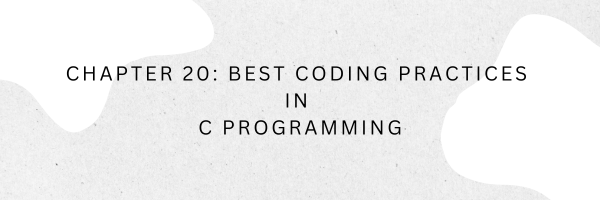Best Coding Practices in C

Welcome back, code enthusiasts, to the next exciting chapter in our journey into the realm of C programming. In this chapter, we’ll navigate through the integral, yet often overlooked, world of best coding practices. We’ll delve into the importance of code readability, ways to avoid common pitfalls, and last but not least, the art of secure coding.
Code Readability and Commenting
First and foremost, let’s talk about code readability and commenting. Writing readable code isn’t about satisfying a stylistic preference, it’s about creating a codebase that’s user-friendly for yourself and for others who might interact with your work.
- Naming Conventions: Variable and function names should be clear, concise, and indicative of their purpose. For instance,
calculateAverage()is more meaningful thanfunc1(), andemployeeCountis better thanvar1. - Consistent Indentation and Spacing: Consistency is key when it comes to indentation and spacing. Regardless of whether you prefer 2 spaces, 4 spaces, or a tab, sticking to the chosen convention throughout the code greatly enhances its readability.
- Commenting: Comments are your silent dialogues with your future self and your fellow programmers. They explain the ‘why’ behind the ‘what’. Comments should be meaningful and to the point, detailing tricky logic or noting down potential areas for future improvement.
Moving on, avoiding common errors can save you precious debugging time and improve the quality of your code.
- Uninitialized Variables: Uninitialized variables can lead to unpredictable results. Ensure that all variables are initialized before use.
- Check Return Values: Don’t ignore the return values of functions. They can provide valuable insights into potential errors or issues in your code.
- Beware of Buffer Overflows: Always ensure that you’re not writing beyond the end of an array. Buffer overflows can lead to crashes or potential security issues.
- Memory Leaks: In C, you are responsible for managing memory manually. If you allocate memory using
malloc()orcalloc(), you need to free it usingfree(). If you lose the last pointer to a block of dynamically-allocated memory without freeing it, that memory becomes a memory leak. - Null Pointer Dereference: If a pointer has not been assigned a valid address (it is NULL), trying to dereference it leads to undefined behaviour, often a program crash. Always ensure your pointers are valid before dereferencing them.
- Off-by-One Errors: Be aware of the inclusive-exclusive principle, especially when working with loops and arrays. Off-by-one errors can lead to crashes or logical errors.
- Array Index Out of Bounds: Its is a common error most programmer get caught with.
- Dangling Pointer: Always set freed pointers to NULL to avoid dangling pointers.
- Not Terminating a String with a Null Character: Always terminate strings with a null character.
- Returning a Pointer to a Local Variable: Never return pointers to local variables. Use dynamic allocation if you need to return a pointer.
- Dividing by Zero: Always check if the denominator is zero before dividing.
- Using
==instead of=in Conditional Statements: Use==for comparisons and=for assignments. - Not Handling
NULLPointers: Always check if a pointer isNULLbefore dereferencing it. - Using Unchecked User Input: Always limit and check user input to prevent buffer overflows.
- Not Using
constQualifier for Unmodified Variables: Use the const qualifier for variables that should not be modified to avoid accidental changes. - Forgetting to Use
breakin aswitchStatement: Always use break to prevent unintentional fall-through in switch statements. - Forgetting to Use
&inscanf: Remember to use & in scanf to modify the variable’s value. - Forgetting to Include Necessary Headers: Always include necessary headers for the functions you’re using.
- Neglecting to Protect Header Files from Multiple Inclusions: Always use include guards to prevent multiple inclusions.
- Comparing Floats Directly: Because of floating-point precision issues, use a small threshold for comparison.
Secure Coding Practices
Last, but definitely not least, we traverse the realm of secure coding. Writing secure code is more important than ever in today’s interconnected digital landscape.
- Input Validation: Always validate external input. Failing to do so could lead to security vulnerabilities or erroneous behaviour.
- Handle Errors Gracefully: Unhandled errors can reveal information about the system, potentially opening up avenues for attacks. Make sure your code can handle errors gracefully, without crashing or revealing too much information.
- Keep Security at Forefront: Use secure functions over their non-secure counterparts, avoid hardcoding sensitive information, and regularly keep yourself updated about common security threats and best practices.
Conclusion
Writing quality code isn’t just about getting the job done, it’s about crafting code that’s reliable, secure, and easily maintainable. As we wrap up Chapter 19, remember that adopting good coding practices isn’t a destination, but an ongoing journey.
May this journey lead you to code that not only works well but also tells a clear, understandable story to those who read it. So, until next time, keep coding and keep improving!
This post was published by Admin.
Email: admin@TheCloudStrap.Com
